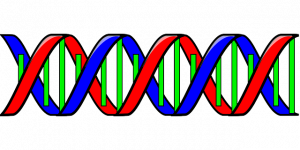Are you looking to take control of your health and well-being? Have you considered the role that epigenetics plays in optimizing gene expression and promoting healthier outcomes?
Epigenetics is the science of how our genes are expressed, or turned on and off, based on environmental factors such as diet, exercise, stress levels, and exposure to toxins. This means that we have the power to positively influence our genetic expression through lifestyle changes and other environmental factors.
By understanding epigenetics and its impact on gene expression, you can take practical steps towards improving your overall health. In this article, we will explore how lifestyle factors such as diet and exercise can affect gene expression, as well as the role of environmental factors like pollutants and chemicals.
We will also provide practical strategies for optimizing gene expression to promote better health outcomes using natural methods. By harnessing the power of epigenetics, you can take an active role in improving your physical and mental wellbeing while reducing your risk for chronic diseases.
Understanding Epigenetics and Gene Expression
 By comprehending the complex relationship between your genetic makeup and the environment you exist in, you can gain a deeper understanding of how your actions and choices impact the way your genes express themselves.
By comprehending the complex relationship between your genetic makeup and the environment you exist in, you can gain a deeper understanding of how your actions and choices impact the way your genes express themselves.
Epigenetic modifications play a crucial role in gene expression by influencing whether certain genes are turned on or off. These modifications occur as a result of environmental factors such as diet, stress, exercise, and exposure to toxins.
Gene regulation mechanisms serve as an essential part of epigenetics, playing a critical role in determining how genes express themselves. These mechanisms involve various processes that modify DNA and its associated proteins without altering its sequence directly. Gene regulation is vital for maintaining healthy cellular function since it helps to ensure that specific genes are activated or repressed at the right times.
Understanding epigenetics enables us to take control of our health by making informed lifestyle choices that optimize gene expression. By reducing exposure to harmful toxins, practicing stress-reduction techniques like mindfulness meditation or yoga, eating a balanced diet with plenty of fruits and vegetables, getting enough sleep each night, and exercising regularly, we can positively influence our gene expression profile.
This knowledge empowers individuals to take charge of their health by taking proactive steps towards optimizing their genetic potential for optimal wellness.
The Impact of Lifestyle Factors on Gene Expression
You can shape your genetic makeup like a potter shapes clay simply by making small changes to the way you eat, move, and rest. Your lifestyle choices play a significant role in determining how your genes express themselves.
Nutrition and exercise are two of the most important factors that affect gene expression. Eating foods rich in vitamins, minerals, and antioxidants can help switch on genes that enhance health and longevity. Regular exercise can also activate genes responsible for metabolic processes, which may help reduce the risk of developing chronic diseases.
Stress and sleep are other lifestyle factors that have a profound impact on gene expression. Chronic stress can trigger an inflammatory response in the body, leading to the activation of genes associated with inflammation and disease. On the other hand, getting enough quality sleep is crucial for optimal health as it allows your body to repair itself and regulate hormones involved in metabolism, immunity, and stress response.
By reducing stress levels through relaxation techniques such as meditation or yoga and improving sleep hygiene habits such as avoiding screens before bedtime or sleeping in a dark room can positively influence gene expression.
In conclusion, your lifestyle choices have powerful effects on how your genes behave. By adopting healthy habits such as eating nutritious foods, exercising regularly, managing stress levels effectively, and getting adequate sleep every night; you may be able to optimize gene expression for better health outcomes over time. Small changes made today could lead to significant benefits tomorrow!
The Role of Environmental Factors in Gene Expression
Understanding how external factors can impact the way your genes behave is crucial in comprehending how changing your habits and surroundings could lead to benefits for you in the long run.
Environmental pollution, for example, has been shown to affect gene expression by altering DNA methylation patterns. Studies have demonstrated that exposure to air pollutants such as particulate matter and ozone may increase oxidative stress levels in the body, leading to changes in gene expression that can contribute to chronic diseases like cancer, cardiovascular disease, and respiratory illnesses.
Dietary influences also play a significant role in modulating gene expression. Certain nutrients have been found to promote or inhibit specific genes’ activity, affecting various physiological processes such as inflammation, metabolism, and cell growth.
For instance, diets high in saturated fats and sugar have been linked with epigenetic changes that increase the risk of developing obesity-related disorders like diabetes and heart disease. On the other hand, consuming foods rich in polyphenols and omega-3 fatty acids may help reduce inflammation levels by activating anti-inflammatory genes.
Overall, understanding how environmental factors influence gene expression is critical for improving health outcomes through lifestyle modifications. By making conscious choices about what we eat and where we live or work, we can positively impact our epigenome’s state and lower our risk of developing chronic conditions associated with altered gene regulation.
Therefore, it’s essential to take proactive steps towards creating a healthy environment that supports optimal gene function while avoiding harmful exposures to toxicants present in our surroundings.
Practical Strategies for Optimizing Gene Expression and Health
Take control of your well-being today by making simple changes to enhance your body’s natural abilities and improve your overall quality of life.
Incorporating proper nutrition and exercise into your daily routine can optimize gene expression and prevent chronic diseases. A balanced diet rich in fruits, vegetables, whole grains, lean proteins, and healthy fats provides essential nutrients that support cellular function and DNA repair.
Exercise plays a crucial role in epigenetics as it promotes the production of growth factors that stimulate cell proliferation and differentiation. Mind-body practices such as meditation, yoga, tai chi, and deep breathing techniques are effective stress management tools that positively influence gene expression.
Chronic stress has been linked to increased inflammation levels and altered DNA methylation patterns leading to various health problems ranging from cardiovascular disease to mental disorders. Regular relaxation exercises can activate genes associated with immune function regulation, thereby reducing inflammatory responses caused by stress hormones.
Incorporating these practical strategies into your lifestyle can significantly impact gene expression leading to improved health outcomes. By optimizing nutrition choices through a balanced diet rich in nutrients while engaging in regular physical activity coupled with mind-body practices geared towards managing stress levels, you become empowered over your genetic makeup, ultimately contributing towards longevity with good health.
Harnessing the Power of Epigenetics for Improved Health and Wellness
Epigenetics has a significant impact on our physical and mental health. The way we live and the environment we expose ourselves to can modify gene expression, leading to either positive or negative results.
Nutrition and epigenetics are interconnected, with certain foods being able to turn genes on or off. For example, consuming foods high in folate and vitamin B12 can help prevent DNA damage that may cause cancer.
Mindfulness is another lifestyle factor that has been linked to changes in gene expression. A study found that individuals who practiced mindfulness meditation had an increase in the activity of genes associated with immune function and stress response.
This suggests that mindfulness meditation could be used as a tool for improving overall wellness by helping us regulate our stress levels and boost immunity.
Harnessing the power of epigenetics for improved health and wellness requires taking proactive steps towards living a healthier lifestyle. This includes making better dietary choices, practicing mindfulness meditation, exercising regularly, getting enough sleep, reducing exposure to toxins, among others.
By leveraging these factors, we can optimize gene expression towards optimal health outcomes. Remember: small changes in your daily routine can lead to big improvements over time!
Can epigenetic changes be reversed?
Epigenetic reprogramming is the process of reversing epigenetic changes. This can be achieved through epigenetic therapy, which involves altering the chemical modifications that regulate gene expression.
While some changes may be difficult to reverse, research has shown that certain lifestyle and environmental factors can play a role in promoting epigenetic reprogramming. For example, exercise and a healthy diet have been shown to positively impact epigenetic marks associated with chronic diseases.
Additionally, certain compounds found in foods such as green tea and turmeric have been shown to have potential as epigenetic therapies. Overall, while the field of epigenetics is still emerging, there are promising avenues for reversing harmful epigenetic changes through lifestyle interventions and targeted therapies.
How do stress levels affect gene expression?
Oh, stress. The one thing we all try to avoid but can’t seem to escape.
Did you know that it can actually affect your gene expression? That’s right, epigenetics and mental health are closely linked.
Studies have shown that chronic stress can lead to epigenetic modulation of immune response genes, which in turn can increase your risk for a variety of health issues such as autoimmune diseases and cancer.
It’s important to find ways to manage stress in order to optimize your gene expression and overall health. Meditation, exercise, and a healthy diet are just a few lifestyle factors that can help reduce stress levels and promote positive epigenetic changes.
So next time you’re feeling stressed out, take a deep breath and remember: your genes are listening.
Can diet and exercise reverse the effects of poor lifestyle choices?
Diet and exercise can have a significant impact on reversing the effects of poor lifestyle choices.
Epigenetic inheritance plays a role in metabolic syndrome, which is linked to poor diet and lack of exercise. However, research has shown that changes in diet and regular exercise can improve gene expression related to metabolic syndrome.
In fact, a study found that just 12 weeks of moderate-intensity exercise improved DNA methylation patterns associated with obesity-related genes.
Therefore, making healthy lifestyle choices can positively affect gene expression and potentially reverse the negative effects of poor lifestyle habits on epigenetic inheritance and overall health.
Can environmental factors permanently alter gene expression?
Imagine a canvas, blank and ready for the painter’s brush. Like that canvas, your genes are waiting to be expressed.
But what if environmental influences could permanently alter that expression? The long term effects of certain factors like pollution, stress, and poor diet have been shown to impact gene expression in significant ways.
Research has found that exposure to toxins can silence genes or turn them on when they shouldn’t be, leading to health problems later in life.
It’s important to remember that while we can’t control all environmental factors, we can take steps towards minimizing their impact by making conscious lifestyle choices.
How can epigenetics be used for personalized medicine?
Epigenetic testing has become a key component in precision medicine, allowing for personalized treatment plans based on an individual’s unique genetic makeup. By analyzing epigenetic markers, doctors can better understand how genes are expressed and identify potential health risks before they manifest into diseases.
With this information, tailored interventions can be developed to optimize gene expression and promote overall health. Additionally, ongoing monitoring through epigenetic testing allows for adjustments to treatment plans as needed.
Precision medicine with the help of epigenetics is revolutionizing healthcare by providing truly personalized care that takes into account each person’s unique genetic profile.
You now have a better understanding of how lifestyle and environmental factors can impact your gene expression and overall health.
By making small changes to your daily routine, such as getting more sleep, reducing stress, exercising regularly, and eating a healthy diet, you can optimize the expression of your genes in a way that promotes wellness.
Remember that epigenetics is not something that’s set in stone. Your genes are constantly being influenced by your environment and lifestyle choices.
This means that you have the power to shape your health outcomes through conscious decision-making. So why not start today? Ask yourself: what small changes can you make to improve your gene expression and overall well-being?
The possibilities are endless!









